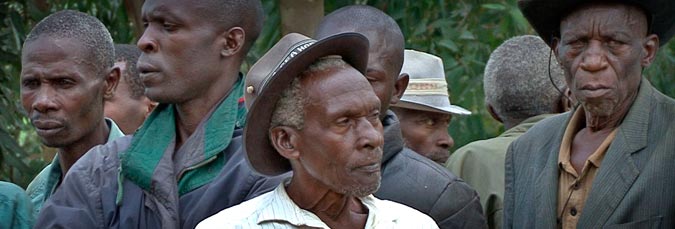Encounters with conflict and peace
In that atmosphere...
what was it like to be an ordinary Tutsi in the villages of Rwanda?
What did they think of the jokes and threats from the local troublemakers?
“That bunch was famous on the hill for their carousing and tomfoolery. Those fellows did not seem so bad... But when they had been drinking, they took sport in spreading misunderstandings and wicked words from cabaret to cabaret.
They used to scoff at the Tutsis and promise them serious retaliation, although they never laid hands on them... Among ourselves, we felt that gang was growing dangersome.” (Clementine, survivor)


During the killings of 1992, they suddenly fired themselves up against the Tutsis and turned very threatening. Those brawls ended without consequence in the neighbourhood, thanks to the wisdom of the municipal judge.
Afterwards we sensed that cruelty had hooked them and could make them go wrong at any time... Yet never did we think they might one day kill at such a great pace.”
From A time for machetes. The killers speak by Jean Hatzfeld
Manipulating the population
But even in the rural areas, some villagers understood that they were being manipulated: exploited by educated men who were fully aware of the violence they were igniting.

From A time for machetes. The killers speak by Jean Hatzfeld
< previous page | next page >
In this section
A HISTORY OF CONFLICT
Real differences
Hutu and Tutsi
A history of conflict
THE POLITICS OF RACISM
Colonialism
A messy power shift
Refugees and scapegoating
Cheap tricks
Preparing for genocide
INSIGHTS
Pressures
In the villages
STORIES
My friend the killer

Real differences
Hutu and Tutsi
A history of conflict
THE POLITICS OF RACISM
Colonialism
A messy power shift
Refugees and scapegoating
Cheap tricks
Preparing for genocide
INSIGHTS
Pressures
In the villages
STORIES
My friend the killer

